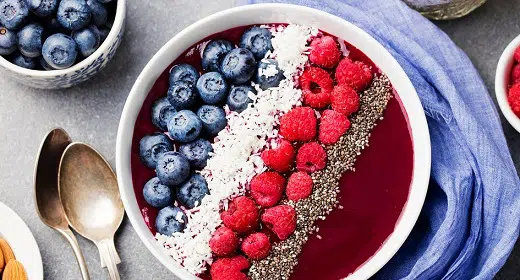by Jill Schildhouse: Ensure your dietary needs are met by regularly including these nutrient-dense ingredients in your plant-based meals…
A common concern for anyone switching to a plant-based lifestyle is ensuring they intake enough of the vital nutrients they used to get from animal proteins — things like protein, iron, amino acids, and vitamin B12. Of course, if you limit yourself to a small range of plant-based options or the same exact foods each day, this could very well be the case. That’s why it’s so important for vegetarians and vegans to get their daily nutrient requirements from a wide array of foods.
Since meal planning is the key to success on a plant-based diet, plant-based dietitian Amy Gorin, MS, RDN, suggests putting some thought into what you’re eating for meals and snacks. “I always recommend that half a plate is made up of fruits or vegetables,” she says, explaining that these foods help with hydration and also provide plenty of filling fiber. “Then, a quarter of your plate should be protein, such as tofu, beans, or edamame. The remaining quarter of your plate should be either whole grains or starchy vegetables. Lastly, add in healthy fats to your meals, such as olives, olive oil, avocado, nuts, nut butters, and seeds.”
While there are some supplements that may help round out a plant-based diet, including the following dozen foods in your regular meal rotation will go a long way toward meeting your needs.
- Avocado. Avocados are one of the best foods for plant-based converts, says celebrity chef, nutritionist and reiki master Serena Poon, CN, CHC, CHN. “Not only will they add flavor to any meal, but they are also incredibly nutrient-dense, supplying fiber, monounsaturated fats, and vitamins and minerals such as folate, vitamins E and K, potassium, riboflavin, and copper.” Try our Avocado Chimichurri Bruschetta recipe.
- Quinoa. Quinoa may taste and act like a grain, but Poon says it also supplies complete proteins, containing all nine essential amino acids. Quinoa is also high in fiber, antioxidants and essential vitamins and minerals such as thiamin, vitamin B6, iron, manganese, magnesium and phosphorus. This grain can be used as a replacement for rice and can be one of your main plant-based staples.
- Açaí. You’ve probably noticed that this tropical fruit hailing from South America is gaining popularity in smoothie bars, health food restaurants and grocery stores nationwide. “The açaí berry is incredibly high in free-radical fighting antioxidants,” says Poon. “An açaí bowl topped with nut butter and fresh berries make a delicious and nutritious morning meal.” Double down on these superfoods with our Açai-Balsamic-Glazed Roasted Root and Quinoa Bowl.
- Leafy greens. Leafy green vegetables — including kale, collard greens, spinach and Swiss chard — supply you with calcium, a necessary nutrient that is often lacking in people on a plant-based diet. “I recommend these every day to provide minerals, such as calcium, and so many nutrients,” says plant-powered dietitian Sharon Palmer, MSFS, RDN. “They are also low in calories, and so versatile, that you can enjoy them cooked or raw.”
- Nutritional yeast. “I love to sprinkle nutritional yeast on pasta salads, rice, roasted veggies, and even popcorn,” says Gorin. “Nutritional yeast is packed with 2 to 3 grams of protein, plus minerals like iron. You’ll also sometimes find nutritional yeast fortified with B vitamins, such as vitamin B12.”
- Nuts and seeds. Aside from being an excellent source of plant-based protein, nuts also deliver fiber, antioxidants, fatty acids, and disease-fighting properties. Regular nut consumption has been shown to decrease the risk of certain chronic diseases, such as cardiovascular disease, obesity, diabetes and cancer.
- Olive oil. Olive oil contains plant polyphenols, which have incredible health benefits, including having antioxidant, anti-inflammatory, anti-allergic, and immune-protecting effects. Poon says to look for high-quality, certified extra-virgin and high-phenolic olive oil.
- Fermented foods. Fermented foods — such as tempeh, kombucha, coconut kefir, and kimchi — contain natural probiotics. “Probiotics support a healthy gut microbiome which supports digestive health, brain health, and immune function,” says Poon. “You can consume probiotics from food sources or from supplements to get the gut-healing benefits.”
- Brassicas, including cauliflower, cabbage and broccoli. “These vegetables have been shown to have high mineral and vitamin content and also to protect against oxidative stress and certain diseases and support immune function,” says Poon. “Plus, they also make delicious snack foods. Their satisfying crunch lends to mid-day snacking and party trays. Mix with a beetroot hummus for a tasty, health-supportive meal.”
- Beans. Beans are an accessible source of plant-based protein that can be the base of any plant-based meal. “Beans, such as kidney, pinto and black, also offer fiber and other nutrients,” says Gorin. “And research shows that people who regularly eat pulses are 22% less likely to be obese, versus people who don’t eat them.” This is also a good time to mention that not considering how your digestion will handle the initial increase in fiber is just one of 10 common mistakes that could make your transition to a plant-based lifestyle harder.
- Soymilk. “Include this as your preferred plant milk, as it’s rich in protein, and the fortified one has vitamin D and calcium too,” says Palmer. “Add to cereals, coffee, baked goods, sauces, and smoothies.”
- Veggie pasta. Swapping out wheat-based pastas for noodles made with sweet potatoes, zucchini or squash is a great way to increase your veggie consumption. “The texture and sauces make it a satisfying replacement meal,” says Poon.










































